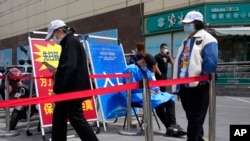China held a massive nationwide meeting this week to coordinate implementation of plans to stabilize and support an economy beleaguered by its zero-COVID policy.
The unprecedented session was convened amid mounting evidence of the economic cost of the nation’s extreme measures to contain the pandemic. Lockdowns across the country, especially in the financial hub, Shanghai, have confined people to their homes, suspended factory production and disrupted supply chains.
This week, the investment bank UBS cut China’s economic growth forecast from 4.2% to 3% for this year, citing the risks from its COVID policy. JPMorgan also lowered its growth estimate to 3.7%, down from 4.3%. These estimates are significantly lower than China’s official growth goal of around 5.5% this year.
Premier Li Keqiang warned at the state council teleconference that the economy is at a “critical point” for determining this year’s economic trajectory and urged the participants to seize “the time window” to push the economy “back on track.”
“The challenge, to a certain extent, is even greater than the initial outbreak of the pandemic in 2020,” state news agency Xinhua quoted Li as saying.
Although the state media didn’t specify the scale of the meeting, The Economic Observer, a Chinese outlet, reported that attendance was required of all Chinese officials at the provincial, city and county levels, totaling more than 100,000 people.
The teleconference followed a state council executive meeting Monday that introduced 33 economic stimulus measures, including increased tax refunds, extended loans to small businesses, emergency loans to the aviation industry, and measures to promote auto and real estate sales.
At Wednesday’s meeting, Li asked the local governments to act on the 33 measures by the end of May. He said the state council would send task forces to 12 provinces to inspect the implementation of the plan starting Thursday, according to the Xinhua News Agency.
Liu Meng-chun, managing director at the Chung-Hua Institution for Economic Research in Taipei, told VOA that local governments are facing many difficulties in implementing Beijing’s zero-COVID policies.
“Medical supply and mass COVID testing are creating large costs for local governments, straining their revenues. Many localities may have to go into debt,” Liu said. “Now it looks like housing prices and land prices are going down, which will further constrain their revenue.”
Liu added that the major reason for the central government to support small businesses is to sustain jobs. Official figures show that China’s unemployment rate jumped to 6.7% in April, higher than the 2020 peak of 5.9%.
“Micro, small and medium-sized enterprise care more about access to financing. They are not well capitalized,” Liu said. “The city was locked down and companies can't work, but they still have to pay their employees. They can't produce finished goods even if they have raw materials piled up in their warehouses.”






